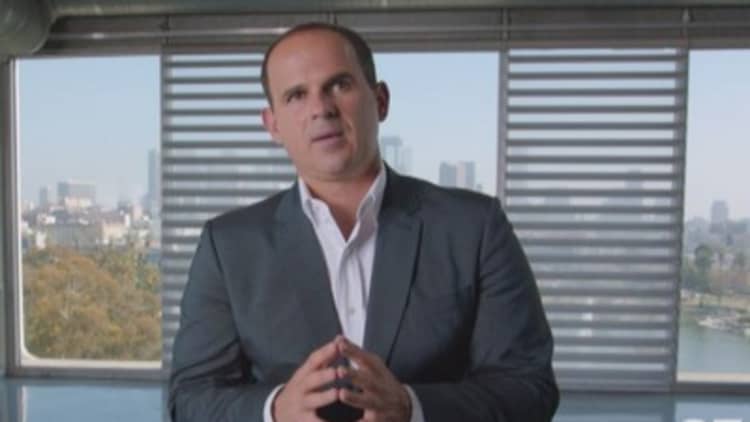On any given day, financial advisor Michael Foltz may find himself listening patiently to siblings who can't seem to agree as to how to jointly run a business they inherited. As head of the business-owner team at Balasa Dinverno Foltz, he has also presided over more than one heated meeting among siblings who own an equal stake in a family business but don't see eye to eye over who gets paid how much and when.
Indeed, Foltz has a job that goes way beyond the typical duties of a financial advisor. As clients go, wealthy business owners usually have a complex and emotionally charged set of issues to work through, from succession planning to estate-tax considerations.
Very often, family squabbles can sink a business that has come a long way under its founder, said Foltz, who tries to head off potential problems by calling "family meetings" and serving as a facilitator.
The aim of such meetings, which bring together his clients, their immediate family members and other stakeholders, is to shine a light on "problem areas" by encouraging participants to discuss difficult issues. Foltz then steers clients to attorneys, family-business consultants and other types of professionals who can help them come up with solutions to hot-button business-related issues.
Read MoreSome firms should trim family tree
Family dynamics are one of the primary reasons most businesses fail to pass successfully to the next generation, explained Foltz. "Working with business owners involves a whole set of considerations that you would not encounter with your run-of-the-mill client," said Foltz, a certified financial planner, lawyer and certified public accountant. Balasa Dinverno Foltz made CNBC's inaugural list of the top 100 fee-only wealth management firms, released earlier this year.
"It's not just about putting together retirement cash-flow projections and managing an investment portfolio," he added. "It is about helping a business owner and his or her family to think through complex issues and working to ensure that the business and the family survive intact."
Succession and retirement
Foltz and other advisors who specialize in working with business owners say the overarching issue for most of their clients is figuring out how and when to transition into retirement. Many business owners have the bulk of their wealth tied up in their companies, and very often they don't have succession plans in place.
"Liquidity is a major issue for business owners," said Jovita Honor, a certified financial planner with Buckingham Asset Management, which was also named one of CNBC's top 100 fee-only wealth management firms earlier this year. "They tend to be heavily invested in their companies.
Read MoreClan warfare: Famous family business feuds
"Their current cash flow and future retirement often hinges on this one business," said Honor, adding that even those who own successful businesses ought to be stashing away money in some type of retirement plan.
"Diversification is important," she said. "Business owners need to put money aside for retirement so that if something happens to the business, they have other resources."

Many business owners also put off succession planning, which can be a time-consuming and sometimes emotionally wrenching process.
As part of the succession-planning process, business owners must decide who is best qualified to run their companies when they retire or die. In doing so, some opt to pass over a child who works in the business in favor of a key employee.
Read MoreBusiness not easy when families fray
Those who decide to sell their business to a third-party rather than an internal successor should strive to make sure companies are positioned to fetch the best possible price, noted Foltz at Balasa Dinverno Foltz. That means avoiding what he calls "the founder's trap," failing to take steps to ensure that a company can survive and thrive in the absence of its founder.
Advisors say business owners can fall into another trap by clinging to unrealistic expectations of what their companies are worth and are likely to fetch in a sale. Objective valuations make a company more attractive to potential buyers. They also put business owners in a better position to make informed decisions from a financial-planning perspective, said Robert Klosterman, a certified financial planner and founder of White Oaks Wealth Advisors.
"Occasionally, owners have unrealistic expectations about what their businesses are worth and can sell for," said Klosterman, whose practice is included in CNBC's ranking of the top 100 fee-only wealth management firms.
Estate taxes, which Foltz at Balasa Dinverno Foltz calls "Uncle Sam's one last bite at the apple," are also a critical issue for high-net-worth family business owners, he said.
Read MoreAdvisors seek small-business clients
Heirs who face a big federal estate-tax bill might be forced to sell a family-owned business to a third party in order pay taxes, notes Foltz. At the beginning of this year, Congress permanently set the federal estate tax-exemption at $5 million, indexed for inflation.
"As an advisor, you have to talk about taxes and whether the business owner's personal net worth will be exposed to estate taxes and how that might impact their ability to transfer the business upon their death," Foltz said.
The family business raises the emotional part of financial planning and the complexity to a third or fourth power because you have many more moving parts and strategies that may be needed.Robert Klostermanfounder of White Oaks Wealth Advisors
Based on that information, owners might opt to do nothing or buy life insurance to ensure that heirs have access to enough cash to pay estate taxes, he added. In some cases, business owners may decide to use sophisticated estate-planning techniques to periodically transfer ownership interests to designated recipients, in an effort to mitigate future estate taxes, he explained.
To be sure, financial advisors who specialize in helping family business owners have their work cut out for them. Keeping such clients happy requires good listening skills, plenty of patience, a willingness to engage their family members and a broad understanding of issues beyond the nuts and bolts of money management, according to advisors.
Read MoreEarly finance training saves small businesses
"The family business raises the emotional part of financial planning and the complexity to a third or fourth power because you have many more moving parts and strategies that may be needed," said Klosterman of White Oaks Wealth Advisors.
Some advisors thrive on the challenges and emotional rewards associated with helping business owners and their families work through difficult issues. It doesn't hurt that such clients are likely to need help managing much larger investment portfolios when they eventually cash out of their businesses.
"A lot of financial advisors focus on assets under management, but these clients have largely illiquid estates until they turn them into some form of liquidity," explained Klosterman. "Making that turn is sometimes a complicated and messy process."
—By Anna Robaton, special to CNBC.com




